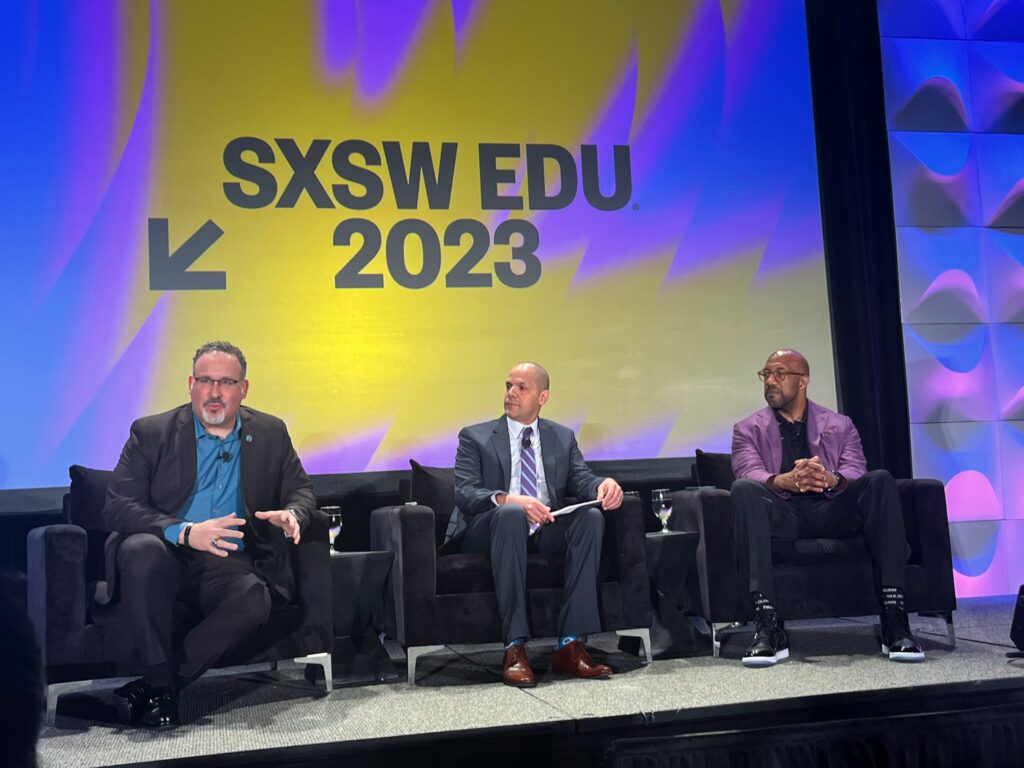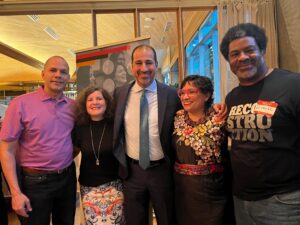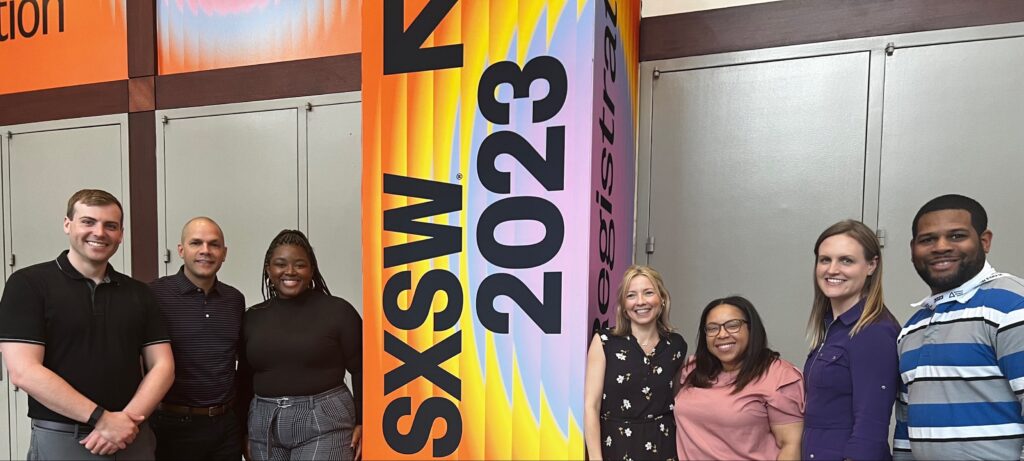SXSW EDU Featured Session: Raise the Bar to Elevate & Diversify the Teaching Profession
March 15, 2023
On Thursday, March 9th, our President and CEO of The Hunt Institute Javaid Siddiqi, Ph.D., was featured on a panel at SXSW EDU moderated by U.S. Secretary of Education Miguel Cardona, Ed.D, and alongside President of Paul Quinn College Michael Sorrell, J.D., Ed.D.
The panel, titled Raise the Bar to Elevate & Diversify the Teaching Profession, focused on the shortages currently facing the teacher pipeline and the lack of diversity in the educator workforce. To listen to the full session, visit the session page on the SXSW EDU website.

Secretary Cardona, Dr. Siddiqi, and Dr. Sorrell on stage during their session.
Recollections about impactful educators
To kick things off, Secretary Cardona shared a story about the first Black teacher he had in elementary school. Mr. O’Neil was an art teacher and inspired him to become a teacher, and he is still in contact with him to this day. Cardona asked Siddiqi and Sorrell to share their first memories of having a teacher of color.

The Texas Capitol building, near where the event was held
Both shared stories about influential instructors that impacted them from childhood through doctoral degrees. The common thread was how those instructors made them feel – seen, safe, and supported. They spoke on how teachers of color often go above and beyond for their students, particularly students of color, in ways other teachers may not be equipped, willing or asked to do.
“I am a large Black male, so I am always conscious of what my physicality means to the environments I’m in,” Sorrell said. “But teachers who look like my mother, look like my grandmother, they don’t see me as a physically imposing individual; they see me as their son, as their grandson.”
To that end, Sorrell emphasized the importance of cultural competency for educators, so they might serve all students better, including those with which they do not share a cultural background.
Siddiqi shared the following data points highlighted by the One Million Teachers of Color campaign (1MTOC):
- If a Black student has just one Black teacher by third grade, they are 13 percent more likely to go to college, and
- that figure increases to 32 percent if they have two Black teachers by the third grade.
He also pointed out that the act of “bending over backwards” for their students of color, while admirable, is also another example of the ‘invisible tax’ teachers of color are often burdened with.
The invisible tax

(L-R) Dr. Siddiqi, Latinos for Education CEO Amanda Fernández, Department of Education Assistant Secretary for Planning, Evaluation, and Policy Development Dr. Roberto Rodríguez, TNTP Chief of Staff Leticia de la Vara, and The Center for Black Educator Development CEO Sharif El-Mekki smile at the SXSW EDU 1MTOC reception
The ‘invisible tax,’ as Siddiqi reminded the audience, is a term coined by former U.S. Secretary of Education John King, Jr., to illustrate the phenomenon, which takes place “when a teacher of color is the only minority teacher in their school [and are] expected to act as experts on every issue related to cultural diversity.”
Siddiqi shared his own personal experience with it, which began in his first year of teaching when he received extra duties due to his assumed ability to connect better with students of color simply because of the color of his own skin.
“For many years I saw it as this doesn’t feel right, this doesn’t feel fair. When I was a principal, I made it very clear that all these types of duties and extra things we’re asking, we’ll be equally asking all of our faculty…everybody’s going to be carrying their fair share,” he said. “We lose more teachers of color by this invisible tax because they’re not being compensated for those asks that we make of them routinely.”
He shared that while initiatives such as the NC DRIVE Task Force and the 1MTOC Campaign seek to increase the recruitment of teachers of color, equally important for both is the retention of those already in the workforce. By addressing the invisible tax in meaningful ways right now, Siddiqi believes principals and superintendents can make a huge difference at the school and district level.
Sorrell mentioned that this tax is a big reason why enrollment at Historically Black Colleges and Universities (HBCUs), including Paul Quinn College, has soared recently – because current and prospective teachers of color are seeking spaces where they are not forced to educate everyone around them. He reiterates that in order to improve diverse teacher retention, teachers and faculty alike must be immersed in cultural competency.
“You cannot teach me if you do not know me,” he said. When more teachers understand how to construct classrooms that reflect the students they serve, the teachers and students will be more successful together.
Secretary Cardona nods, citing the work of Gloria Ladson-Billings and Rudine Sims Bishop.
“In this age of fabricated division that some are trying to do, it’s our responsibility to lift up those principles and practice that just connect students better. Good pedagogy never goes out of style, and if you’re connecting with the learner, you’re more likely to help them grow,” he said.
Leveraging HBCUs
Cardona then shifted gears to focus on Historically Black Colleges and Universities (HBCUs) and how they consistently “punch above their weight,” producing:
-

(L-R) Drs. Siddiqi, Cardona, and Sorrell posing for a picture after the session.
80% of Black federal judges,
- 75% of Black officers in the armed forces, PhDs, and doctors,
- 70% of Black dentists,
- 50% of Black lawyers, engineers, and teachers,
- 40% of the Black members of Congress,
- 25% of Black graduates in STEM fields, and
- 100% of Black, female vice presidents graduated from HBCUs
Sorrell emphasized the importance of protecting HBCUs, diversity, and American history in this country. For Sorrell, if the history of why HBCUs exist is not taught, we cannot then support the initiatives being discussed. He shared that despite beliefs or accusations that such curricula will be the source of further division, he found it to be not only a contextual necessity but also a powerful motivator for those he teaches.
“I tell my students all the time, ‘Don’t tell me you can’t solve calculus, don’t tell me you can’t do physics, don’t tell me that you can’t be a great leader, because you are the descendent of the people who survived the most harsh system in this country. You are the descendant of people who fought back and excelled,’” he said.
He shared the ways in which Paul Quinn seeks to not only identify talent early through their E-TIP program, but also prepare future educators to not only navigate the realities of today’s schools from the classroom but also as decision makers in leadership positions in the wider education system.
“Here’s the data point we should sit with,” began Siddiqi. “HBCUs represent only seven percent of all college students. HBCU graduates represent 50 percent of all educators of color. So, we have great things coming from HBCUs, but it’s a drop in the bucket when you think about all college graduates.”
He went on to express his emphatic support for investing in HBCUs in order to grow seat capacity, pointing to the proven efficacy of their education programs as a clear pathway to boost the number of students being positioned to take on those leadership roles. Siddiqi shared the vision of Governor Jim Hunt, who more than 20 years ago created The Hunt Institute to provide policymakers with the research and support to make good, equitable education policy decisions and reforms – such as the recent development of a bipartisan, bicameral HBCU state caucus in North Carolina.

The Hunt Institute sent a star-studded team to SXSW EDU this year, including members of our Equity Initiatives and Higher Education teams, the latter of which have been driving the creation of HBCU caucuses in numerous states. (L-R: Deputy Director of Higher Education Dr. Winn Decker, President & CEO Dr. Javaid Siddiqi, Hunt Institute Intern Lauren Relaford, Vice President Michele Jordan, Director of Equity Initiatives Dr. Ashlee Canty, Director of Higher Education Dr. Madeline Smith, Senior Program Manager for Educator Diversity Sean Banks)
In conclusion
At the end of the session, Secretary Cardona invited questions from the audience, the first of which was how we might create environments for recruited teachers of color in which they have a real seat at the table.
Siddiqi responded with a call to action for principals and other school leaders to first, support inclusive curricula, because seeing oneself reflected in learning materials in meaningful ways is impactful for both student and teachers’ feelings of belonging and support; and second, be as maniacal about building the structures that will allow teachers of color to thrive as you are about recruiting them.
The second question asked how teaching conditions might be improved overall, to which Sorrell replied, “Stop bullying teachers!” and followed up by emphasizing the need to increase teacher pay and advocate for teachers even when it might be uncomfortable, reminding the audience that, “nothing great ever comes from places of comfort.” Siddiqi added the need to engage policymakers across the aisle to address issues faced by the profession, and specifically educating them on what the data is really telling us about how we can solve the problem.
To end the session, Secretary Cardona chose to end on a positive note, asking both panelists to share words of encouragement with prospective teachers, despite the challenges they had discussed. Both simply said it was an enormous privilege to be able to work with and influence young people.
“My all-time favorite job was being in a classroom. When you impact a child’s life, there’s no greater gift,” said Siddiqi.

One Million Teachers of Color campaign partners joined panelists on stage after the session (L-R: Mimi Woldeyohannes, Michele Jordan, Dr. Madeline Smith, Dr. Ashlee Canty, Sean Banks, Secretary Miguel Cardona, Dr. Javaid Siddiqi, Dr. Michael Sorrell, Sharif El-Mekki, Dr. Winn Decker)




